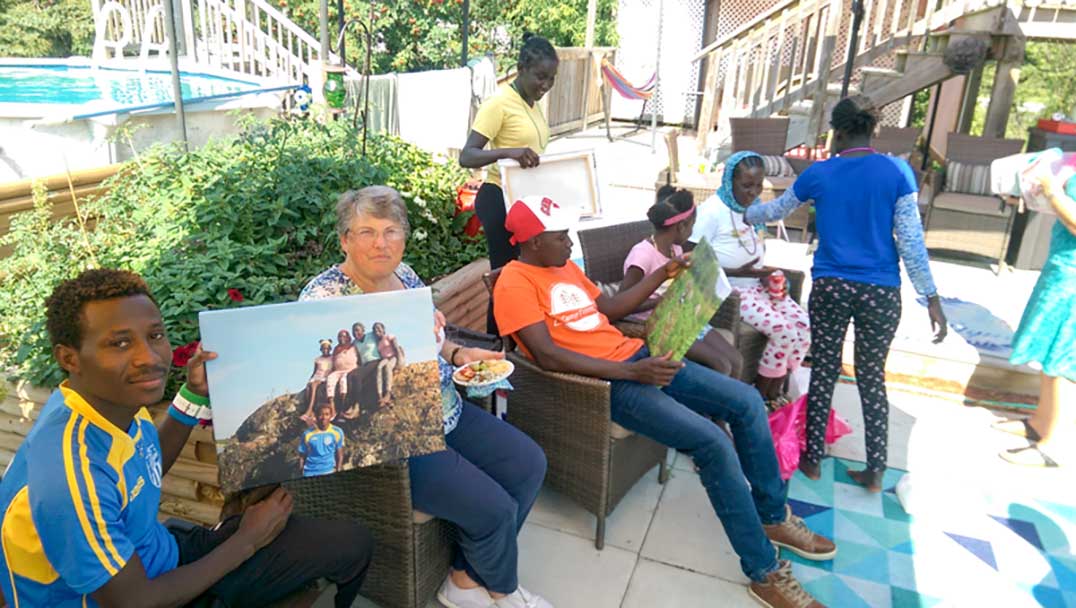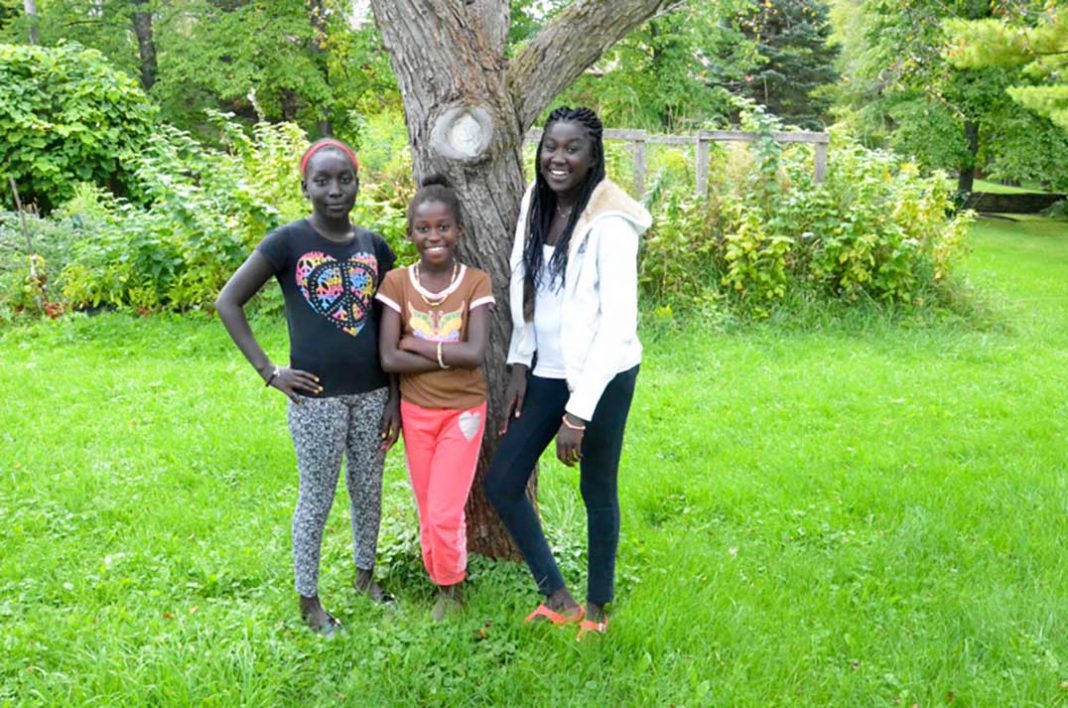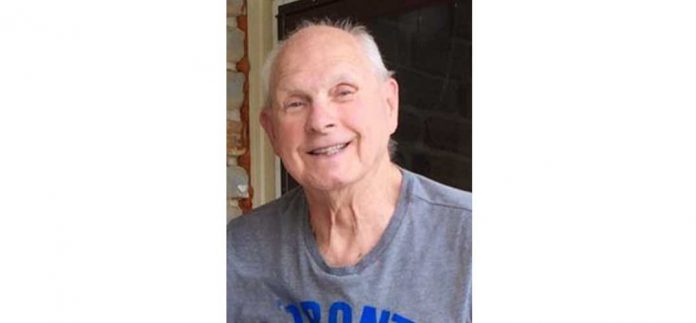LITTLE CURRENT—It was a bittersweet moment as friends and supporters of the family of Jamati Agar Alibay gathered at the Little Current home of Linda and Michael Erskine for a going away party.
Ms. Agar Alibay’s family moved to Manitoulin sponsored by the Manitoulin Refuge Committee, a group of dedicated volunteers that included a number of local doctors and health professionals as well as just plain folks who wanted to help make a difference.
Like many communities across the world, Manitoulin Island’s response to the refugee crisis facing the globe was initially galvanized by the image of a two-year-old Syrian child whose lifeless body had washed up on a Mediterranean beach.
“That image broke my heart,” said Ms. Erskine. “I just knew we couldn’t stand by and not do anything to help.” When Dr. Roy Jeffery approached her to help galvanize a group of Island volunteers Ms. Erskine jumped at the opportunity to help.
In the end, it wasn’t the Syrian refugees that became the focus of Manitoulin’s efforts. “Ben and Sarah Quackenbush brought forward the work of the Mennonite Refugee Committee, who already had a list of Eritrean refugees that had been languishing in camps in Ethiopia,” she recalled. The plan developed by the volunteer group that began meeting in St. Bernard’s Roman Catholic Church was to bring five families to Manitoulin, in order to hopefully build a mutually supportive group that could help sustain the families as they settled into Canada.

Ms. Erskine recalled the moment that the Little Current family arrived at the Sudbury airport in the middle of a blustery February morning. “This little girl in a sundress and flip-flops came running across the tarmac calling out ‘Linda, Linda’,” she laughed. “The family had been travelling for three days, flying from country to country on their way here. The only thing they knew was that they were coming to Canada and that a lady named ‘Linda’ would take care of them.” Luckily there was a warm bus donated by A.J. Bus Lines waiting to whisk them away to their new Island home.
Of course there were a lot more people than “Linda” who would take up the job of helping the family settle into their new home on Campbell Street. There were the folks who organized the clothing and furniture drives that saw enough material donated to completely outfit the five families who would be arriving on Manitoulin Island in the coming months; the hardy moving crews who brought the furniture into the homes that had been found to house the families; the host of English as a second language teachers who dedicated their evenings to working with the families to help them learn their new language. There were bookkeepers who taught the families the ins and outs of home finance and the art of timely bill paying, the driving instructors who took the older members of the families out on the road and the gardeners who helped the families get their gardens in.
Now, more than a year later, many of the members of the Little Current family have moved to Ottawa where another of the families had already moved. Ottawa has a well-established Cunami speaking diaspora and Romme, the third eldest child in the family, will be undertaking post-secondary studies in kinesiology there. The two elder sons in the family have jobs on Manitoulin and will possibly be joining the family in Ottawa later.
The Expositor sat down with the youngest members of the family, the three girls Hallom, Halima and Matuda, who were moving with their mother to Ottawa.
Asked if they were nervous about the move to a new and much larger city, the eldest Hallom (who is entering Grade 11) admitted “a little,” before qualifying “really nervous.”
All three young women have acquired impressive linguistic skills since that February morning where “Linda” was just about the sum total of their English lexicon.
Asked what their impressions of Manitoulin have been there was no hesitation. “It’s so beautiful here,” said Hallom. “We were so happy to be here.”
“It was very different,” said Halima, who is entering Grade 8 this year. “Yes, here everything is so different,” confirmed Hallom. The girls found a warm welcome on Manitoulin, despite the frosty weather, and the girls settled in well. “Everyone wanted to be my best friend,” enthused Matuda. Things were a little slower for Hallom. “I am shy,” she admitted. “Really shy.”
The hardest part of Canada to get used to for the girls took no hesitation. “Winter,” they all chimed at once. “There is no winter in Ethiopia.” Being one of the hottest, if not the hottest, countries in the world, winter was a novel and frightening experience. “I thought winter would never end,” admitted Romme. But winter brought a lot of new and different things that they enjoyed.
“Skating,” supplied Hallom. “We liked skating… and hockey. There is no hockey in Ethiopia.”
“Sliding,” interjected Matuda. “Yes, sliding,” admitted Hallom. “We really liked sliding.”
Still summer was a welcome surprise. With it came another novel experience that proved popular with the girls. “Swimming!”
The biggest challenge met by the family in their new home was language. “English,” said Matuda. “English was hard,” admitted Hallom. “But English is the most important thing,” insisted Matuda. “At first it was very difficult to talk,” said Hallom, “but we worked hard and learned.”
“It was hard to eat,” chimed in Matuda. Adapting to a Canadian diet also produced plenty of challenges as the family toured the grocery store with volunteer nutritionist Tammy Albers. Some things were familiar, especially potatoes and pasta. “Spaghetti,” chirped Matuda. “And rice,” said Halima. “Our favourite is rice.”
“Hamburgers!” continued Matuda, “and pizza!” “Pizza is our favourite,” corrected Halima. “Watermelon is my favourite,” enthused Matuda.
“There is so much food here,” offered Hallom quietly.
Another pleasant surprise was the friendliness of the people they met when they arrived on Manitoulin. “Everyone was nice,” said Matuda. “We never met anyone who wasn’t friendly. All the people were friendly.”
The girls are looking forward to their future in Canada, a world of opportunities lies ahead of them that is a little daunting, but they have plans that would have been far more difficult to attain in the heart of a refugee camp where they had spent their entire lives before coming to Canada.
“I would like to be hairdresser or a doctor,” said Hallom. “Nurse,” chimes in Halima. “I don’t know what I want to do yet,” admitted the youngest, Matuda.
There was one thing the girls wanted to see included in their story. “We want to say thank you so much to all of the kind people who have helped our family,” said Hallom. “Yes, thank you,” chimed in Matuda. “We will always remember you.”
In these days of social media, Facebook and Twitter, the girls plan to keep in touch with the many friends they have made on Manitoulin and plan to come back to visit when they can.




